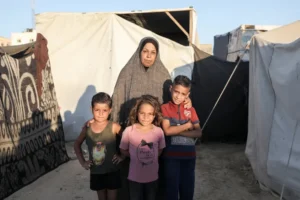‘My children cry all day from the heat’: Life in Gaza’s tent camps

Nimah Elyan, 45, and three of her children in the Deir el-Balah tent camp where they have lived since March, August 2024
Maram Humaid reports in Al Jazeera on 7 August 2024:
Deir el-Balah, Gaza – It is around 7:30pm and the sun is setting when Nimah Elyan and her four youngest children return home – a beige-coloured tent in a temporary camp in Deir el-Balah in central Gaza – after trying to escape the heat by going to the beach.
“The tent in the summer is hell,” says 45-year-old Nimah as she uses a sponge and a bucket of water to wash her children who are under the age of seven. “We cannot stay inside the tent for even five minutes during the day. The heat is absolutely unbearable.” To escape the sweltering conditions during the day, Nimah takes her children to swim in the sea, which lies a few kilometres away.
Her children look sleepy as they pull off their clothes, their skin reddened from being outdoors all day. Nimah’s four-year-old daughter sits on the ground eating fava beans, leftovers from last night’s dinner.
“My children cry all day from the heat,” she says, explaining how their skin suffers from constant exposure to the sun, a lack of hygiene products and water scarcity. The water they use to bathe and drink is collected by her children from the nearby hospital.
“Every day around 11am, when the weather becomes unbearable, we ride on a donkey cart to the sea,” Nimah explains. Going to the sea is not easy, but Nimah says the heat gives her no choice. But when there are Israeli attacks, they are forced to stay in the camp and in their hot tent.
It costs the family about 20 shekels ($5) for the 40-minute donkey cart ride to the shore and they often have to wait in the sun before securing transportation. Sometimes it never arrives, and they walk to the beach. Once there, Nimah sits on the sand and watches her children. Sometimes she joins them in the water.
And when they return home in the evenings, Nimah washes the salt from her children’s bodies and then tries to feed them with whatever is available. “The living conditions are very difficult. Because of this daily journey, we miss the food distributed daily by the community kitchen, which makes providing food a problem,” she shares. Some days they stay in the camp to collect food from the community kitchen that distributes free meals or food aid parcels.
‘Ravaged our children’s bodies’
